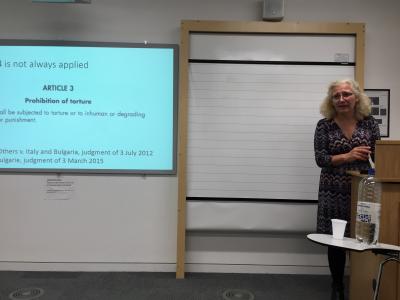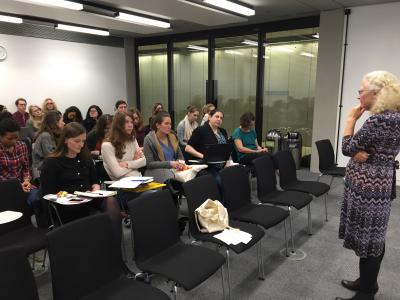Guest post by Elizabeth Kullman, MSc student, Centre for Criminology, University of Oxford. Elizabeth is on Twitter @Lika_NK.

Despite the ECtHR being the last bastion of human rights’ protection, Dembour interprets the ways it deals with incidents of human trafficking, particularly with reference to Article 4 on the prohibition of slavery, servitude and forced or compulsory labour, as problematic. The majority of case law relating to human trafficking has relied on Article 4 but Dembour presented two cases, Siliadin v. France and Rantsev v. Cyprus and Russia, where this Article has been applied and interpreted by the ECtHR.
In Siliadin v. France the ECtHR found that the applicant had been held in servitude after being trafficked from Togo, which was evidenced by a clear deprivation of autonomy, being subjected to forced labour and having no means of removing herself from the situation. Since France had no legislative or administrative framework at the time to protect the rights of the applicant who found herself in this situation, the state was found to be in breach of Article 4. Siliadin v. France is an exemplary case because the judgment brought to light the necessity for positive obligations of the member state in relation to human trafficking, something that had previously been lacking in case law. Prior to this case there had been no legal judgments recognising positive obligations under Article 4 of the ECHR. The Article was, instead based on negative obligations, i.e that the state must refrain from human rights violations. Therefore, with Siliadin v. France the ECtHR established a state’s positive obligation to take affirmative action to ensure the practical and effective protection of the rights of victims or potential victims of trafficking. Whilst this was a landmark case, the judgment, Dembour argues, was based on a narrow view of the state’s obligation in protecting the rights of trafficked people. It dealt only with the exploitation of Siliadin in France and therefore did not address the process of human trafficking.
The case of Rantsev v. Cyprus and Russia was brought by the father of Oxana Rantseva, a young woman who had been trafficked from Russia to Cyprus under an ‘artist’s’ visa scheme. There, she was subject to sexual exploitation by a cabaret group. She attempted to leave the group, however was stopped by the cabaret’s owner and died soon after from injuries sustained from a fall – she had attempted to escape via the balcony of the room in which she was being kept. The ECtHR found that there were several breaches of Article 4 at various stages of the case and this led to a clarification of the positive obligations of the states in relation to human trafficking, as introduced in the case of Siliadin v. France. Firstly, there is an obligation to have a legal and administrative framework that can be used to deal with incidents of human trafficking. Secondly, when the state becomes aware of incidents involving forced labour, servitude or slavery, it must take suitable protective measures. Finally, the state is obliged to investigate instances involving the aforementioned. The ECHR was therefore used in a way that broadened the scope of Article 4 to deal with human trafficking in a more comprehensive way than in the case of Siliadin v. France. It recognised that trafficking of people treats humans as commodities to be bought, sold and put into forced labour, therefore can be understood as a ‘regime of modern slavery’. By accepting that human trafficking falls within the remit of Article 4, the ECtHR dealt with the transnational nature of human trafficking rather than solely the exploitation of victims within the receiving state.
Despite raising the human rights standards for trafficking victims and extending human rights jurisprudence, Dembour argued that Article 4’s requirement of positive obligations has stagnated the development of case law. Lack of development in case law, has, in turn, meant that applicants face much heavier burdens of proof, allowing the state to ‘get away’ with offering very little protection. It is this aspect that Dembour terms as the ‘fall’ of Strasbourg case law.

Dembour’s presentation highlighted not only the practical issues that the ECtHR faces in dealing with problems surrounding migration but also, perhaps more importantly, stressed the need to reframe our understanding of migration so that we do not forget that those in question are people who deserve to be treated with respect and dignity and that the ECtHR should place their rights, rather than those of the state, at centre stage. As the opening line from Dembour’s book asserts, “Migrants are human beings too” – perhaps this is something that Strasbourg needs to remember.
Any comments about this post? Get in touch with us! Send us an email, or post a comment here or on Facebook. You can also tweet us.
Keywords:
Share:








